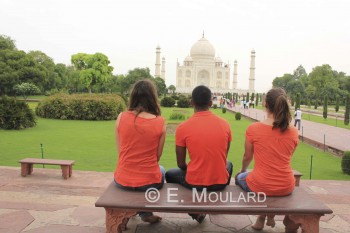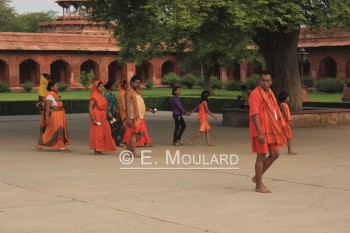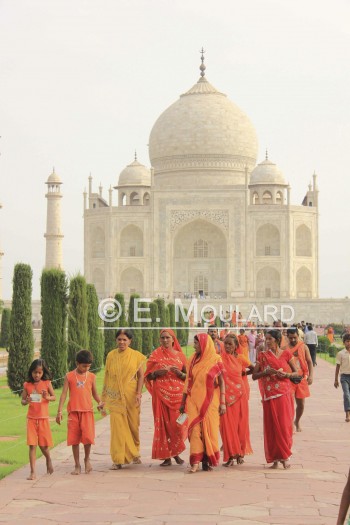07/30/2012
Seeing life in orange...
Here is what happens when I decide to do things differently... And dress up funny to see the Taj with my friends!!
We throw in a few ideas, most of them impractical since my friends are visiting and don't have so many clothes... And it so happens that it is only in orange that I have 3 tee-shirts!! So here we go, we will be the orange team!!
But the story doesn't stop here... Everyone seems to have had the same idea!!
Well actually it turns out the Shiva processions from Delhi to Haridwar have started and Agra is on the way... And the pilgrims' colour is orange...
So much for being oranginal!!
08:00 Posted in Funny things about India in photos, My stories in India | Permalink | Comments (0) | Tags: india, agra, taj, orange, shiva pilgrims | ![]() Facebook | |
Facebook | |
07/28/2012
To remember that everyone does not have running water on this planet...
I have not yet fully understood how water works in Delhi. For example water cuts are very frequent. In fact there is a huge problem in some areas.
In my warehouse, for example, there is a guy who comes to fill the tank twice a week.
In my house I do not know how it works exactly. There are tanks on the roof and when they are empty, someone activates a pump which gets them filled. If the person in question is not here, not pump so no water!
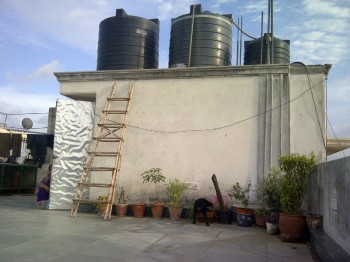
08:02 Posted in Expatriation (in India and in other countries), Funny things about India in photos, Incredible India!, My stories in India | Permalink | Comments (0) | Tags: india, delhi, water, running water | ![]() Facebook | |
Facebook | |
07/26/2012
Fatehpur Sikri
Last June, while monsoon was glooming, I went for my first outing since I have moved to Delhi. Fatehpur Sikri.
I was most interested in visiting this ghost town I had heard about!!
I have to say I was a bit disappointed as it is more of a palace, the kind you see a lot in Rajasthan, than a ghost town.
However I really liked the place, it was very big and hardly anyone was visiting it.
It is called a ghost city because it was inhabited for only 13 years (from 1572 to 1585) before being abandoned as water had dried out. I always thought one must be stupid to build a city on a dry place but water had actually been abundant there since pre-historic time…
Talking of water, I loved the master bedroom with the summer bed, on a platform 2 meters high; in summer time, they would fill the floor with water and rose water so that it would cool down and smell good!
Fatehpur Sikri was the “first planned city of the Mughals” and the residence of the Mughal Emperor Akbar (son of Humayun, grandson of Babur the first Mughal Emperor). He had “shifted his residence and court from Agra to Sikri to honour the Sufi Saint Sheikh Salim Chishti, who resided here (in a cavern on the ridge).”
So there are two parts to visit: the palace and the religious courtyard with the tomb of the saint which is super famous. It is said that if you go there, place a piece of cloth on the tomb, throw rose petals, make three wishes and tie a thread on the window, your wishes will come true. Legend has it that this is how Carla Bruni got her baby!!
Akbar was a great Emperor, illiterate but cultivated and ultra-tolerant. 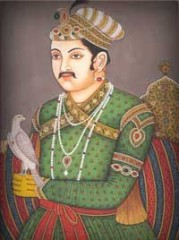
As his Muslim ancestors before him, he had to fight the Rajputs (Hindus), who were dangerous but not unified. “Make love not war”: Akbar married the daughter of a Rajput King (from Amber) – she was offered to him as her father was seeking protection of Akbar against his peers who wanted to take his throne. “Akbar followed the same feudal policy toward the other Rajput chiefs. They were allowed to hold their ancestral territories, provided that they acknowledged Akbar as emperor, paid tribute, supplied troops when required, and concluded a marriage alliance with him.” “In total, Akbar had 36 wives of various ethnic and religious backgrounds.”
“Probably even more importantly to his ordinary subjects, Akbar repealed a special tax placed on Hindu pilgrims who visited sacred sites, and completely repealed the jizya, or yearly tax on non-Muslims. What he lost in revenue by these acts, he more than regained in good-will from the Hindu majority of his subjects.”
 |
| Fatehpur Sikri, UP - June 2012 |
Sources:
http://asi.nic.in/asi_monu_whs_fatehpursikri.asp
http://www.britannica.com/EBchecked/topic/11421/Akbar
http://asianhistory.about.com/od/india/p/akbarthegreatbio.htm
08:00 Posted in Travelling (in India!) | Permalink | Comments (0) | Tags: india, fatehpur sikri, akbar, muslims, hindus, religion, ghost town, saint sufi sheikh salim chishti | ![]() Facebook | |
Facebook | |















